| Listing 1 - 8 of 8 |
Sort by
|
Book
ISBN: 2251449191 9782251449197 Year: 2019 Publisher: Paris: Les Belles Lettres,
Abstract | Keywords | Export | Availability | Bookmark
 Loading...
Loading...Choose an application
- Reference Manager
- EndNote
- RefWorks (Direct export to RefWorks)
Jews --- Jedwabne Massacre, Jedwabne, Poland, 1941. --- Holocaust, Jewish (1939-1945) --- World War, 1939-1945 --- Jedwabne (Poland)
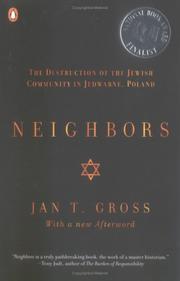
ISBN: 0142002402 Year: 2002 Publisher: New York, N.Y. : Penguin Books,
Abstract | Keywords | Export | Availability | Bookmark
 Loading...
Loading...Choose an application
- Reference Manager
- EndNote
- RefWorks (Direct export to RefWorks)
On a summer day in 1941 in Nazi-occupied Poland, half of the town of Jedwabne brutally murdered the other half: 1,600 men, women, and children-all but seven of the town's Jews. In this shocking and compelling study, historian Jan Gross pieces together eyewitness accounts as well as physical evidence into a comprehensive reconstruction of the horrific July day remembered well by locals but hidden to history. Revealing wider truths about Jewish-Polish relations, the Holocaust, and human responses to occupation and totalitarianism, Gross's investigation sheds light on how Jedwabne's Jews came to be murdered-not by faceless Nazis, but by people who knew them well.
Holocaust, Jewish (1939-1945) --- Jews --- World War, 1939-1945 --- History. --- Collaborationists --- Jedwabne (Poland) --- Ethnic relations.
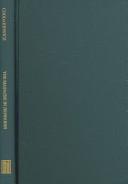
ISBN: 0880335548 Year: 2005 Publisher: Boulder (Colo.) : New York : East European Monographs ; Distributed by Columbia University Press,
Abstract | Keywords | Export | Availability | Bookmark
 Loading...
Loading...Choose an application
- Reference Manager
- EndNote
- RefWorks (Direct export to RefWorks)
Holocaust, Jewish (1939-1945) --- World War, 1939-1945 --- Atrocities --- Jedwabne (Poland) --- History.
Book
ISBN: 2213611483 9782213611488 Year: 2002 Publisher: Paris : Fayard,
Abstract | Keywords | Export | Availability | Bookmark
 Loading...
Loading...Choose an application
- Reference Manager
- EndNote
- RefWorks (Direct export to RefWorks)
Jews --- Holocaust, Jewish (1939-1945) --- Juifs --- Holocauste, 1939-1945 --- History --- Histoire --- Jedwabne (Poland) --- Jedwabne (Pologne) --- Ethnic relations --- Relations interethniques
Book
Abstract | Keywords | Export | Availability | Bookmark
 Loading...
Loading...Choose an application
- Reference Manager
- EndNote
- RefWorks (Direct export to RefWorks)
Holocaust, Jewish (1939-1945) --- Collective memory --- Juifs --- Jedwabne, Pogrom de (1941) --- Mémoire collective --- Relations interethniques --- Jedwabne (Poland)
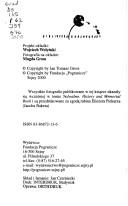
ISBN: 8386872136 Year: 2000 Publisher: Sejny : Pogranicze,
Abstract | Keywords | Export | Availability | Bookmark
 Loading...
Loading...Choose an application
- Reference Manager
- EndNote
- RefWorks (Direct export to RefWorks)
Holocaust, Jewish (1939-1945) --- Jews --- World War, 1939-1945 --- Holocauste, 1939-1945 --- Juifs --- Collaborationists --- Jedwabne (Poland) --- Jedwabne (Pologne) --- Ethnic relations. --- Relations interethniques
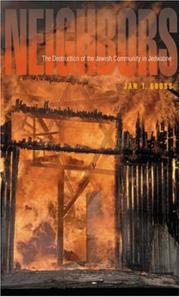
ISBN: 0691086672 9786613903365 1400843251 1283590913 Year: 2001 Publisher: Princeton (N.J.) Princeton university press
Abstract | Keywords | Export | Availability | Bookmark
 Loading...
Loading...Choose an application
- Reference Manager
- EndNote
- RefWorks (Direct export to RefWorks)
One summer day in 1941, half of the Polish town of Jedwabne murdered the other half, 1,600 men, women, and children, all but seven of the town's Jews. Neighbors tells their story. This is a shocking, brutal story that has never before been told. It is the most important study of Polish-Jewish relations to be published in decades and should become a classic of Holocaust literature. Jan Gross pieces together eyewitness accounts and other evidence into an engulfing reconstruction of the horrific July day remembered well by locals but forgotten by history. His investigation reads like a detective story, and its unfolding yields wider truths about Jewish-Polish relations, the Holocaust, and human responses to occupation and totalitarianism. It is a story of surprises: The newly occupying German army did not compel the massacre, and Jedwabne's Jews and Christians had previously enjoyed cordial relations. After the war, the nearby family who saved Jedwabne's surviving Jews was derided and driven from the area. The single Jew offered mercy by the town declined it. Most arresting is the sinking realization that Jedwabne's Jews were clubbed, drowned, gutted, and burned not by faceless Nazis, but by people whose features and names they knew well: their former schoolmates and those who sold them food, bought their milk, and chatted with them in the street. As much as such a question can ever be answered, Neighbors tells us why. In many ways, this is a simple book. It is easy to read in a single sitting, and hard not to. But its simplicity is deceptive. Gross's new and persuasive answers to vexed questions rewrite the history of twentieth-century Poland. This book proves, finally, that the fates of Poles and Jews during World War II can be comprehended only together.
Jews --- Holocaust, Jewish (1939-1945) --- Juifs --- Holocauste, 1939-1945 --- History. --- Histoire --- Jedwabne (Poland) --- Jedwabne (Pologne) --- Ethnic relations. --- Relations interethniques --- -Jews --- -Hebrews --- Israelites --- Jewish people --- Jewry --- Judaic people --- Judaists --- Ethnology --- Religious adherents --- Semites --- Judaism --- Catastrophe, Jewish (1939-1945) --- Destruction of the Jews (1939-1945) --- Extermination, Jewish (1939-1945) --- Holocaust, Nazi --- Ḥurban (1939-1945) --- Ḥurbn (1939-1945) --- Jewish Catastrophe (1939-1945) --- Jewish Holocaust (1939-1945) --- Nazi Holocaust --- Nazi persecution of Jews --- Shoʾah (1939-1945) --- Genocide --- World War, 1939-1945 --- Kindertransports (Rescue operations) --- History --- Nazi persecution --- Persecutions --- Atrocities --- Jewish resistance --- -Ethnic relations --- -History --- -Yedwabne (Poland) --- Yedṿabnah (Poland) --- Ethnic relations --- Hebrews --- Yedwabne (Poland)
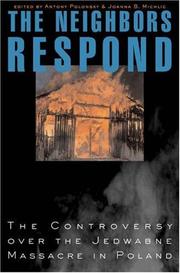
ISBN: 0691116431 0691113068 9786612158582 1282158589 1400825814 9781400825813 9780691116433 9780691113067 Year: 2004 Publisher: Princeton, N.J. Princeton University Press
Abstract | Keywords | Export | Availability | Bookmark
 Loading...
Loading...Choose an application
- Reference Manager
- EndNote
- RefWorks (Direct export to RefWorks)
Neighbors--Jan Gross's stunning account of the brutal mass murder of the Jews of Jedwabne by their Polish neighbors--was met with international critical acclaim and was a finalist for the National Book Award in the United States. It has also been, from the moment of its publication, the occasion of intense controversy and painful reckoning. This book captures some of the most important voices in the ensuing debate, including those of residents of Jedwabne itself as well as those of journalists, intellectuals, politicians, Catholic clergy, and historians both within and well beyond Poland's borders. Antony Polonsky and Joanna Michlic introduce the debate, focusing particularly on how Neighbors rubbed against difficult old and new issues of Polish social memory and national identity. The editors then present a variety of Polish voices grappling with the role of the massacre and of Polish-Jewish relations in Polish history. They include samples of the various strategies used by Polish intellectuals and political elites as they have attempted to deal with their country's dark past, to overcome the legacy of the Holocaust, and to respond to Gross's book. The Neighbors Respond makes the debate over Neighbors available to an English-speaking audience--and is an excellent tool for bringing the discussion into the classroom. It constitutes an engrossing contribution to modern Jewish history, to our understanding of Polish modern history and identity, and to our bank of Holocaust memory.
Antisemitism --- Holocaust, Jewish (1939-1945) --- Jews --- History --- Moral and ethical aspects --- Persecutions --- Gross, Jan Tomasz. --- Jedwabne (Poland) --- Ethnic relations. --- Anti-Jewish attitudes --- Anti-Semitism --- Catastrophe, Jewish (1939-1945) --- Destruction of the Jews (1939-1945) --- Extermination, Jewish (1939-1945) --- Holocaust, Nazi --- Ḥurban (1939-1945) --- Ḥurbn (1939-1945) --- Jewish Catastrophe (1939-1945) --- Jewish Holocaust (1939-1945) --- Nazi Holocaust --- Nazi persecution of Jews --- Shoʾah (1939-1945) --- Hebrews --- Israelites --- Jewish people --- Jewry --- Judaic people --- Judaists --- Nazi persecution --- Yedwabne (Poland) --- Yedṿabnah (Poland) --- Ethnic relations --- Prejudices --- Philosemitism --- Genocide --- World War, 1939-1945 --- Kindertransports (Rescue operations) --- Ethnology --- Religious adherents --- Semites --- Judaism --- Atrocities --- Jewish resistance --- Holocaust, Nazi (Jewish Holocaust) --- Nazi Holocaust (Jewish Holocaust) --- Nazi persecution (1939-1945)
| Listing 1 - 8 of 8 |
Sort by
|

 Search
Search Feedback
Feedback About UniCat
About UniCat  Help
Help News
News